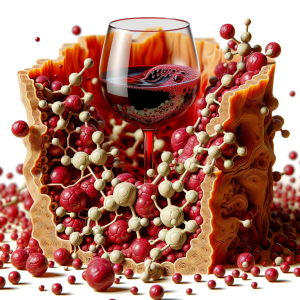Red wine has a long history dating back thousands of years. Its production has been perfected over time, from ancient fermentation techniques to modern winemaking. The ancient Egyptians, Greeks and Romans already enjoyed this drink, which has remained a fundamental part of culture and gastronomy throughout history. Do you want to know what red wine is good for? We tell you below all the benefits of consuming red wine and its properties. Are you going to miss it? Experience the epitome of sophistication and luxury with our handcrafted Barcelona wine tours, where you’ll be treated to exclusive tastings, private vineyard tours, and personalized experiences tailored to satisfy even the most discerning wine connoisseur.
Composition of red wine
Red wine is made mainly from red grapes and its color comes from pigments present in the grape skin. In addition to water, red wine contains alcohol, sugars, acids and a wide variety of chemical compounds, including polyphenols, tannins and antioxidants. These components play a crucial role in the taste and health benefits of red wine.
Unlock the secrets of Spanish winemaking with our comprehensive wine courses in Barcelona, where you’ll delve deep into the world of viticulture, tasting your way through a curated selection of varietals from Catalonia’s most esteemed wineries.
Health benefits of red wine

Antioxidants
Red wine is a rich source of antioxidants, especially resveratrol and quercetin. These compounds help fight free radicals in the body, which can reduce the risk of chronic diseases and premature aging. Studies have shown that resveratrol may have anti-cancer properties and protect the heart.
Cardiovascular benefits
One of the most prominent benefits of red wine is its potential to improve cardiovascular health. Moderate consumption has been associated with a reduced risk of heart disease, including coronary artery disease. This is due in part to antioxidants and the positive effect of alcohol on cholesterol levels. It also helps to control cholesterol levels.
Weight control
Another benefit of red wine for women especially, is that it may be related to weight control and metabolism regulation. Some studies suggest that resveratrol may influence weight loss and reduce fat accumulation in the body.
Anti-inflammatory properties
Red wine contains anti-inflammatory compounds that can help reduce inflammation in the body. This is especially relevant for people suffering from chronic inflammatory diseases, such as arthritis.
Helps prevent cancer
Red wine contains resveratrol, a potent antioxidant that has been linked to the prevention of certain types of cancer. Studies suggest that resveratrol may inhibit the growth of cancer cells and reduce the spread of tumors. While these findings are promising, it is important to remember that red wine is not a substitute for medical treatment and should be consumed in moderation.
Diabetes prevention
Red wine may have a role in the prevention of type 2 diabetes. Studies have suggested that resveratrol may improve insulin sensitivity, thus helping to maintain more stable blood sugar levels. However, it is important to remember that people with diabetes should consume alcohol with caution and under the supervision of a healthcare professional.
Relaxing effects
Red wine is known for its relaxing effects. Moderate consumption can help reduce stress and anxiety, promoting relaxation and psychological well-being.
Cognitive benefits
It has been observed that moderate consumption of red wine is associated with improved cognitive function. Antioxidants and resveratrol may have a positive impact on brain health, reducing the risk of cognitive decline and neurodegenerative diseases.
Health properties of red wine
Red wine is not only known for its health benefits, but it also possesses a number of unique properties that make it stand out as an exceptional beverage.
Color and tones
One of the most distinctive characteristics of red wine is its wide range of colors and tones. These can range from an intense ruby red to softer shades, such as garnet or purple. The diversity of red wine colors is due to the variety of grapes used and the aging process in oak barrels, which influences its tonality.
Aromas and bouquet
Red wine is appreciated for the complexity of its aromas and bouquet. Each grape variety and region of production can result in a wide range of fragrances. Some red wines may have fruity notes, such as cherry, plum or red fruits, while others may have earthy, spicy or floral aromas. The bouquet of red wine develops during the fermentation and aging process, giving it a unique sensory richness.
Tannins
Tannins are natural compounds present in the skin, seeds and stems of grapes. They are responsible for the sensation of dryness and astringency in the mouth when drinking red wine. Tannins not only influence the structure and flavor of wine, but also act as natural preservatives, contributing to the longevity of the beverage. The amount and type of tannins vary according to the grape and winemaking method.
Wine body
The body of the wine refers to its mouthfeel, which can range from light to full or robust. Red wines tend to be more “full-bodied” compared to white wines, due to prolonged maceration with the grape skins during fermentation. This characteristic brings a unique texture and structure to red wine, making it suitable for pairing with a wide variety of dishes.
Aging
Red wine has an exceptional ability to age and improve over time. As the wine matures in oak barrels and then in bottles, its flavors become more complex and smoother. The aging process allows tannins to integrate and aromas and flavors to evolve, resulting in a more balanced and refined wine.
Culinary versatility
Red wine is known for its versatility in the kitchen. Its wide variety of flavors and textures makes it a perfect complement to a wide range of dishes. From red meats to cheeses to pasta dishes and stews, red wine can enhance the dining experience and enhance the flavors of food.
Red wine is much more than a delicious beverage. Its health benefits, both physical and psychological, mean that enjoying a glass in moderation can be part of a healthy lifestyle. However, it is essential to remember that excessive alcohol consumption can have negative health effects, so drink responsibly.









